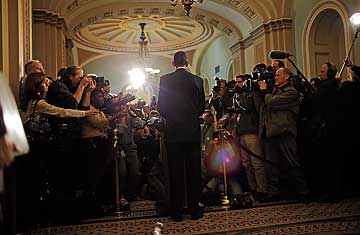
Obama aides say they can't rely on reporters to referee public debates.
There was never a single moment when White House staff decided the major media outlets were falling down on the job. There were instead several such moments.
For press secretary Robert Gibbs, the realization came in early September, when the New York Times ran a front-page story about the bubbling parental outrage over President Obama's plan to address schoolchildren--even though the benign contents of the speech were not yet public. "You had to be like, 'Wait a minute,'" says Gibbs. "This thing has become a three-ring circus."
For deputy communications director Dan Pfeiffer, the more hyperbolic attacks on health-care reform this summer, which were often covered as a "controversy," flipped an internal switch. "When you are having a debate about whether or not you want to kill people's grandmother," he explains, "the normal rules of engagement don't apply."
And for his boss, Anita Dunn, the aha moment came when the Washington Post ran a second op-ed from a Republican politician decrying the "32" alleged czars appointed by the Obama Administration. Nine of those so-called czars, it turned out, were subject to Senate confirmation, making them decidedly unlike the Russian monarchs. "The idea--that the Washington Post didn't even question it," Dunn says, still marveling at the decision.
All the criticism, both fair and misleading, took a toll, regularly knocking the White House off message. So a new White House strategy has emerged: rather than just giving reporters ammunition to "fact-check" Obama's many critics, the White House decided it would become a player, issuing biting attacks on those pundits, politicians and outlets that make what the White House believes to be misleading or simply false claims, like the assertion that health-care reform would establish new "sex clinics" in schools. Obama, fresh from his vacation on Martha's Vineyard, cheered on the effort, telling his aides he wanted to "call 'em out."
The take-no-prisoners turn has come as a surprise to some in the press, considering the largely favorable coverage that candidate Obama received last fall and given the President's vows to lower the rhetorical temperature in Washington and not pay attention to cable hyperbole. Instead, the White House blog now issues regular denunciations of the Administration's critics, including a recent post that announced "Fox lies" and suggested that the cable network was unpatriotic for criticizing Obama's 2016 Olympics effort.
White House officials offer no apologies. "The best analogy is probably baseball," says Gibbs. "The only way to get somebody to stop crowding the plate is to throw a fastball at them. They move."
